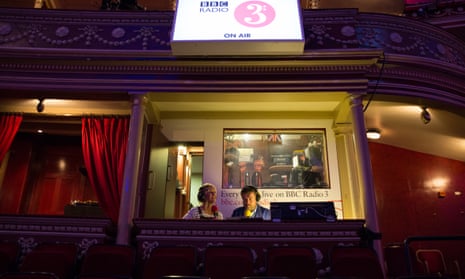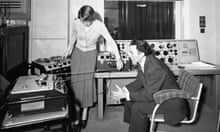Charlotte Higgins (After 70 years, Radio 3 needs a rethink. Time to hand it over to the composers, 24 September) offers some interesting prescriptions for revitalising Radio 3. Fundamentally, though, it’s the station’s rootedly conservative ideology that hinders it from exciting audiences by any more imaginative means than apeing commercial radio stations via regular quizzes coupled with tedious round-the-clock “selling” of musical works as if they were brands of soap powder.
Truly popularising Radio 3 would require the sort of attitude-shift called for by Nicholas Cook in his book Music: A Very Short Introduction – undermining the “musical museum” mindset by foregrounding the contemporary and representing the music of past centuries as not trapped in dead history but continuing, fluid, vital.
Presentations by current composers could do this, but no one move would better symbolise a new beginning than moving the wonderful Hear and Now programme from its graveyard slot of 10pm on Saturday and repeating it (rather than Composer of the Week) most weekdays.

Who knows, younger folk in particular might like hearing what’s really new and vital – especially if offered by dynamic and informed presenters such as Verity Sharp and Ian McMillan who don’t fall back on weary cliches or received opinions to communicate.
Michael Ayton
Durham
The rethink of Radio 3 whereby composers would be put in charge of the station reminded me of a rearguard heroically defending a lost cause.
The BBC gave us the iPlayer internet streaming catchup service and yet it is bounded by the rationality of yesterday. For example, it could devolve Radios 1, 2 and 6 to its commercial arm, BBC Worldwide. Radio 4 could be retained and Radio 3 reconfigured into a digital platform for jazz, folk, world music, classical music and opera. The BBC could also assist fledgling online radio stations in delivering the widest range of music and serving every niche and genre.
A multigenre channel could be developed, called something like BBC Music Live, to ensure that cultural assets such as the BBC orchestras and live music output were retained, and enhanced with the opportunity for new work of all kinds. A prime example is the Proms, which should be a vibrant reflection of the diversity of the UK music scene instead of (bar a few cosmetic changes) being locked in the past.
Chris Hodgkins
London

Radio 3 needs all the freedom it can be offered, as it is unconcerned with politics, economics, fashion etc. If this unique channel were made available to creative people – composers, painters, writers and others in different areas of science – who are able to innovate and astonish with their ideas, it would over time come to be accepted as a leading force in our culture.
Its audience may be small at the moment, but with adept promotion it could grow considerably. I see it thus as a major investment in the future.
Meirion Bowen
London
Charlotte Higgins is so right. Far too few composers’ voices, lavish airtime for yet more brilliant young clarinettists, a suffocating conviction that “classical” music is all wonderful, and always belongs to the past – that’s Radio 3.
Here are two provocations to make the point. I suggest, first, that twice every month the Composer of the Week should be a living person; and, second, that every day some dissenting and quarrelsome voices should be heard (for instance, dismissing Beethoven as boring or Benjamin Britten as shallow).
I suspect that the staff of Radio 3 would love both of these ideas; not so sure about the listeners.
Robert Bunting
Cambridge
If we hand over Radio 3 to the composers, perhaps there should be a discrete programming time for them, as there is for jazz. If we have enough notice, we music lovers can then switch off and turn to our CD or vinyl collections for the duration.
And to make matters fair, Radio 1 and Radio 2 could be obliged to broadcast at least an opera a week and two or so hours of Beethoven, Mozart, etc every day. That would make sense, wouldn’t it?
Prebendary Neil Richardson
Braintree, Essex
Radio 3’s audience “too narrow”? It has me as a listener and I am keen as well on sciences, arts, geography, history and politics, and I belong to two campaigns in Brighton and Chichester against privatisation of the NHS, and with some successes. Too narrow?
Paul Bunting
Worthing, West Sussex
The only thing wrong with Radio 3 is all the talking.
Rachel Twiselton
Poole




